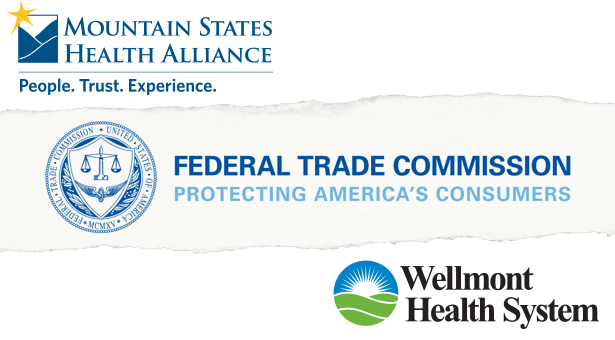By Jeff Keeling
Wellmont Health System and Mountain States Health Alliance’s bid to become a single, $1.9 billion hospital system passed a critical juncture last month. The Sept. 15 Tennessee Department of Health (TDH) decision to deem the systems’ application for a Certificate of Public Advantage (COPA) complete – granted seven months after the initial application was submitted – set the clock ticking toward a final decision at the state level. A similar ruling Aug. 26 by the Southwest Virginia Health Authority (SVHA) regarding the application in that state means decisions are pending in Nashville and Richmond by the end of January. Judging by the healthcare merger landscape, though, the states’ decisions may not mark the end of the journey.
Players ranging from the Federal Trade Commission (FTC) and federal judges to healthcare economists, hospital lobbyists and their opposite numbers from the health insurance industry present a picture that is uncertain at best, muddled at worst. Two days before this magazine went to press, for instance, a federal circuit court judge in Pennsylvania overturned a lower court judge’s decision that had approved a merger in the Harrisburg market. A May decision that hospital advocates had hailed as a victory has now flipped to the advantage of the FTC, which had argued the proposal’s disadvantages outweighed its benefits. The fulcrum at the center of this uncertainty is the federal Patient Protection and Affordable Care Act (or ACA, or Obamacare, depending on one’s chosen parlance). Some say mergers, even those that reduce competition, represent an opportunity to meet the goals of the ACA and give hospital systems their best opportunity to improve care, reduce costs, and contribute to better overall population health. Others, including the FTC, argue that if competition is reduced by too great a degree, any benefits are unlikely to outweigh the disadvantages.
An additional wrinkle complicates the Wellmont-Mountain States situation – that of “state action immunity.” The concept that states can construct laws explicitly designed to displace competition with regulation and “active supervision” is at the heart of Tennessee’s COPA law, and is further designed to shield a merged system from standard federal and state antitrust law. Should the departments of health and attorneys general of Tennessee and Virginia decide by early 2017 that the benefits from a proposed “cooperative agreement” between the systems outweigh the disadvantages caused by reduction in competition, the journey toward consolidation may be complete – or it may not. As this article will show, even the limited but growing number of merger proposals relying on state laws designed to provide antitrust immunity are the subject of intense scrutiny. Whether their accompanying regulatory mechanisms can adequately replace competition and insure benefits continue to outweigh disadvantages remains the subject of debate. And the nation is watching situations like the one here. As TDH noted in its release about the application being deemed complete, “this process is complex and precedent-setting.” And the FTC has done more than just hint that it feels no motivation to remain hands-off even in merger scenarios where state action immunity has been invoked.
If they merge – a name and an annual bill from the state
A fair bit happened between Sept. 9 and Sept. 15 on the Tennessee side of the merger ledger. On the 9th, the hospital systems submitted to TDH a much more robust “plan of separation” that would be triggered should an approved merfer later be determined not to be beneficial to the public. TDH had called the first iteration of that plan insufficient, and while the systems had argued that such a detailed plan shouldn’t have to be submitted at this stage, they relented (the plan of separation can be read at bjournal.com/separationplan).
A day before TDH deemed the application complete, the systems shared with the media a letter they had sent to employees. That letter explained that, “Once our merger is approved, Mountain States Health Alliance and Wellmont Health System will become Ballad Health. And our tag line will be, ‘It’s your story. We’re listening.’”
More broadly, the proposal continues to be scrutinized in minute detail, just as any approved Wellmont-Mountain States merger will continue to be – or so it appears. A merger would be governed by the COPA in Tennessee and the Cooperative Agreement in Virginia, with a high degree of regulation imposed in an effort to insure the benefits outweigh the disadvantages. Those regulations stem in Tennessee and Virginia from the laws that made them possible. Those laws did two main things in order to provide state action immunity from federal and state antitrust law “to the fullest extent possible” to hospitals issued a COPA. First, they established as state policy the lessening of competition among hospitals to promote cooperation and coordination in provision of health services. Second, they set up a system for “active supervision” of any such collaborations.
That active supervision won’t come cheap, and Ballad Health would foot the bill. The Tennessee General Assembly’s “fiscal note” on the bill’s impact estimated a $353,100 annual recurring cost for oversight. That money would pay for, primarily, two new staff positions ($223,088 including salaries, benefits and office space), an estimated $100,000 in annual contracts with expert consultants, and $20,000 for obtaining regionally specific data. All of it, the fiscal note said, is necessary to provide the ongoing analysis required.
On the Virginia side, rules governing the cooperative agreement mandate a $20,000 annual fee to be due when a merged system files its annual report (an updated plan of separation must also be filed annually). If the commissioner of Virginia’s Department of Health determines the cost to the department exceeds $20,000, that fee can rise to a maximum of $75,000.

Virginia Association of Health Plans’ Doug Gray speaks at a May meeting of the Southwest Virginia Health Authority in Abingdon. Photo by Jeff Keeling
Doug Gray, director of the Virginia Association of Health Plans (VAHP), questions how realistic that state’s approach to the possibility of eventual oversight is, at least based on the evidence he’s seen so far. Gray has been a fixture at SVHA meetings, strongly advocating for more information. He admits that as an advocate for the health insurance industry, he anticipates opposing the merger regardless of what additional conditions are placed on the hospital systems between now and any approval that might occur. He says the ongoing oversight piece is one of his primary areas of concern.
“The idea that they will be able to steer it is attached to a certain overestimation of the influence of a regulating entity,” Gray says. “There’s been no good discussion whatsoever about having the resources available to appropriately monitor such an agreement if it were approved. Staff is not in place, there’s not enough FTEs, there’s no process in place, there is no understanding of how things would be checked and when. What’s been described to us so far is an annual report that somebody reads, and that’s it.”
Even if those issues are addressed, Gray says, “it will be after the fact supervision. It might even fall into the category of accountability, maybe. We’re not talking about, when they go way off onto the shoulder, somebody being able to reach over there and grab the wheel and pull them back. That isn’t going to happen. They’re not even in the car.”
Gray, who says he plans to attend additional public meetings and hearings between now and Virginia’s decision, also anticipates the FTC stepping further off of the sidelines in this merger case, possibly even before the states announce their decision. Agency representatives have listened by phone during SVHA meetings and offered some written comment to both states, but the FTC has refrained so far from showing its hand completely.
Reading the FTC’s tea leaves
The greater Tri-Cities’ merger process is taking place within the context of ongoing changes in hospital business models, largely precipitated by the ACA. The FTC traditionally has challenged any business arrangements it deems anticompetitive, including those in the hospital realm. As reported early this year in the Business Journal, the agency had enjoyed a string of successful challenges to mergers stretching into 2015. (see bjournal.com/continued-ftc-scrutiny-likely-despite-mergers-proposed-structure).
This year has brought some different results, though – results that leave far from resolved the uncertainty surrounding the broader issues of consolidation, anticompetitive effects and how those things all stack up in a post-ACA world. Judges in Illinois and Pennsylvania have gone against the FTC in its challenges of proposed mergers, but an appeal in the Pennsylvania case resulted in a victory for the FTC just two days before this issue went to press in late September.
In June, a federal judge in Chicago declined the FTC’s request that he issue an injunction to temporarily halt a merger between two area systems. A month earlier, another federal judge denied the FTC’s injunction request that would have halted a merger between two systems in the Harrisburg, Pa. area. A Modern Healthcare article on the cases published June 16 noted, however, that legal antitrust experts were advising caution as healthcare systems consider mergers. “(M)any experts believe the government will ultimately prevail in the Pennsylvania case,” the article by Lisa Schencker noted, adding that several dozen prominent economists and antitrust experts filed a friend of the court brief siding with the FTC and criticizing the judge’s methodology, particularly when it came to determining market share.
On Sept. 27, it appeared those experts were right to bet on the government. The Third Circuit Court of Appeals in Philadelphia overruled the earlier decision, granting an injunction preventing merger until after a hearing in the FTC’s administrative court. The merger had been stayed pending the appeal.
The director of the FTC’s bureau of competition, Debbie Feinstein, said in a statement Sept. 27 the agency was “very pleased” with the ruling, which she said found the FTC had a likelihood of successfully blocking the merger based on the merits. “We look forward to proving our case,” she said.
What about state action immunity?
The Chicago and Harrisburg cases differ significantly from the local situation in one crucial respect – the state action immunity doctrine. This leaves the FTC with less direct interventional power, but that hasn’t stopped the agency from weighing in on such cases. Indeed, the MSHA-Wellmont proposal has generated letters from the FTC to Tennessee and Virginia.
The agency’s Mark Seidman’s comments at a June 7 public hearing took the standard FTC line on COPA-type arrangements. “Although our analysis is ongoing, experience shows that the kinds of commitments proposed by the parties to date, which are designed to constrain their conduct after the merger, generally do not replicate the benefits of competition.,” Seidman said. He added that the FTC planned to submit additional written comments after the COPA application was deemed complete, “so we can provide the most informed and complete analysis possible.”
A month after Seidman’s comments, on July 6, the FTC took a strong position regarding what it called, “another example of healthcare providers attempting to use state legislation to shield potentially anticompetitive combinations from antitrust enforcement.” That example was a recently passed law in West Virginia, similar to Tennessee’s COPA law, that retroactively provided state action immunity to a proposed merger in the Huntington market the FTC had challenged last November. The statement came following the FTC’s decision to dismiss its administrative complaint from November, “in light of the passage of West Virginia Senate Bill 597.”
In a three-page statement, the FTC wrote that it believed state cooperative agreement laws such as the West Virginia statute, “are likely to harm communities through higher healthcare prices and lower healthcare quality.” The statement also addressed what it said are claims by COPA proponents, “that antitrust enforcement undermines the policy goals of the Affordable Care Act to improve quality and lower costs through greater coordination among healthcare providers,” calling that notion “fundamentally incorrect.” The statement, complete with one of its eight footnotes, claims the ACA doesn’t condone mergers that substantially lessen competition. It goes on, though, to reference its own “Horizontal Merger Guidelines” and acknowledge those “expressly recognize that mergers ‘may result in lower prices, improved quality, enhanced service, or new products,’ and that these possible benefits must be evaluated and weighed against potential anticompetitive harm.” Any such benefits must be “merger-specific” to pass FTC and Department of Justice scrutiny.
Warning bell for Ballad?
In its July 6 statement, the FTC didn’t specify its reason for dismissing its complaint in the Huntington merger. It did continue to assert its allegation that the Huntington case produced a combination, “likely to result in loss of competition that is not outweighed by improvements in quality and cost efficiencies.” It said state-enabled cooperative agreements often protect transactions “that impose harms far exceeding their benefits.” It called the laws, “and any accompanying promises providers may make, no matter how well-intentioned or sophisticated,” an inadequate substitute for “the manifold benefits of competition.”
The statement also questioned the usefulness of separation agreements meant to pave the way for a successful unwinding should a merger eventually be found not to be delivering advantages that outweigh the benefits. The FTC wrote that mergers are difficult to unwind, leaving “no easy remedy if a cooperative agreement fails to deliver its promised benefits.”
In what could be considered at least an indirect message to Tennessee and Virginia, the statement promised the FTC, “will continue to vigorously investigate and, where appropriate, challenge anticompetitive mergers in the courts and, if necessary, through state cooperative agreement processes. Our decision to dismiss the complaint without prejudice does not necessarily mean that we will do the same in other cases in which a cooperative agreement is sought or approved.”
Opinions vary on the matter
Following the FTC’s standing down in the Huntington merger, the American Hospital Association’s general counsel, Melinda Reid Hatton, took the FTC to task for its continued insistence that its traditional merger guidelines apply in the current healthcare climate. “If nothing else, this case should serve as a wake-up call for the FTC to come to grips with how the health care landscape is changing and the proper role competition policy should play in that evolution.”
John Jones III, the judge who made the initial ruling allowing the Harrisburg, Pa. merger, referenced several times in his 26-page opinion the changes the ACA is driving, including the shift to risk-based contracting. Those changes, he wrote, are changing the rules of the game and calling into question previous notions about competition, collaboration, and the need for scale to spread cost of infrastructure for population health over larger systems.
Jones wrote that his decision, “recognizes a growing need for all those involved to adapt to an evolving landscape of healthcare that includes, among other changes, the institution of the Affordable Care Act, fluctuations in Medicare and Medicaid reimbursement, and the adoption of risk-based contracting. Our determination reflects the healthcare world as it is, and not as the FTC wishes it to be. We find it no small irony that the same federal government under which the FTC operates has created a climate that virtually compels institutions to seek alliances such as the Hospitals intend here.”
Of course, the Third Circuit Court saw it another way, and for his part, VAHP’s Gray believes the FTC will step off the sidelines in the Wellmont-Mountain States matter.
“We are pretty confident that there will be a challenge from both the FTC and private companies,” Gray says. “The private companies would be ‘if necessary,’ but the FTC should weigh in sooner. One of the parlor questions for folks participating in this process is, ‘when is the FTC going to weigh in?’ What they’ve said behind the scenes, and a little bit publicly, is that there’s a standard for supervision of a granting of a monopoly through a COPA, and that that standard is constitutionally described by the Supreme Court in an interpretation that needs to be met. That’s why you hear us say consistently they haven’t met that standard. If they don’t meet that standard, the FTC will intervene and the court will back up the FTC because the standard hasn’t been met.”





